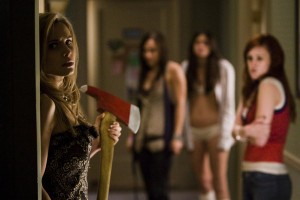Sorority Row
 You know what might make an interesting frat house slasher movie? If they incorporated reverse gentrification instead of just the standard “rich bitches.” Imagine a sorority struggling to find funding, and as the economy dips further, so does the state of their house. They can’t afford a caretaker, they can’t even pay for clean water, and then all of a sudden, someone starts hacking them up. It would be funny because some of those struggling with real problems, not stuff like “will Daddy buy me a nice car for Homecoming,” but, “am I going to have to get extra hours at Burger King just to pay for my books,” might see the dilemma of a mysterious killer as just another issue to deal with. Rather than run and scream up the stairs, or while they stare at dead bodies, the poorer students would try to deal with the murderer in a logical fashion. Of course the movie would be a lot shorter since they’d figure out the killer’s identity a lot faster and find a smart way to dispatch him. But what’s the harm in a tightly edited 60 minute slasher movie, as opposed to 90 minutes of petty idiots forgetting to check if the guy on the floor is actually dead?
You know what might make an interesting frat house slasher movie? If they incorporated reverse gentrification instead of just the standard “rich bitches.” Imagine a sorority struggling to find funding, and as the economy dips further, so does the state of their house. They can’t afford a caretaker, they can’t even pay for clean water, and then all of a sudden, someone starts hacking them up. It would be funny because some of those struggling with real problems, not stuff like “will Daddy buy me a nice car for Homecoming,” but, “am I going to have to get extra hours at Burger King just to pay for my books,” might see the dilemma of a mysterious killer as just another issue to deal with. Rather than run and scream up the stairs, or while they stare at dead bodies, the poorer students would try to deal with the murderer in a logical fashion. Of course the movie would be a lot shorter since they’d figure out the killer’s identity a lot faster and find a smart way to dispatch him. But what’s the harm in a tightly edited 60 minute slasher movie, as opposed to 90 minutes of petty idiots forgetting to check if the guy on the floor is actually dead?
 That’s not to say that Stewart Hendler’s Sorority Row is a complete waste of time, though it is too long and drawn out (101 minutes! That ought to be some sort of crime for a movie like this). Remaking a relatively obscure slasher movie from 1983, The House on Sorority Row, means that there will be probably less crowing by fans of “ruining a classic.” But Hendler’s film doesn’t bear too much resemblance to the original, changing the motives, the killer, most of the plot points and the tone, so you wonder why he didn’t just make an “original” film*.
That’s not to say that Stewart Hendler’s Sorority Row is a complete waste of time, though it is too long and drawn out (101 minutes! That ought to be some sort of crime for a movie like this). Remaking a relatively obscure slasher movie from 1983, The House on Sorority Row, means that there will be probably less crowing by fans of “ruining a classic.” But Hendler’s film doesn’t bear too much resemblance to the original, changing the motives, the killer, most of the plot points and the tone, so you wonder why he didn’t just make an “original” film*.
Hendler does retain the opening prank, though the details are not similar (nor similar to other prank-gone-wrong slasher films like The Burning), but he incorporates modern technology, and allows for a believable set-up for a revenge-minded killer to appear (as well as a deadly, souped-up tire iron). It also ups the mean-spirited nastiness angle with the sorority girls, such as when one of them offers her thoughts on the virtues of being drugged with roofies, “you get laid and you get a good night’s sleep.” And when I say “one of” instead of specifying the character, it’s because like all boilerplate slasher films, Sorority Row has very little to distinguish the characters. Lined up like the Five Dwarfs, there’s the nerd (the chintastic Rumer Willis), the slut (who self-applies the name Chugs for reasons other than her alcohol imbibing ability), the bitch, the conscience, and, uh, the Asian one, since everyone else in the movie is white.
 Sorority Row is so formula-ridden that even the female nudity comes abundantly packed into one shower scene, as if it were a box to be checked off and moved on from. There’s the minor celebrity in a cameo added to give the movie respectability (Carrie Fisher as the house mother), foreign-born actors who keep dropping their American accents, and the look-alike and therefore cheaper version of a faintly known star (the younger sister of the first victim is a dead ringer for Winnie Cooper). Sorority Row contains the usual inadvertent messages of a slasher movie; Based on this particular sorority; it is made quite clear that anorexia is bad for the brain. As is joyless sex for that matter, such as a scene where in exchange for a slew of prescription drugs, Chugs agrees to sleep with her therapist (30 years her senior and with only 30% of his hair). After “freshening up,” she has trouble finding him (guess what happened?), to which she sighs and utters in a rather bored manner, “I don’t have time for catch me, rape me.”
Sorority Row is so formula-ridden that even the female nudity comes abundantly packed into one shower scene, as if it were a box to be checked off and moved on from. There’s the minor celebrity in a cameo added to give the movie respectability (Carrie Fisher as the house mother), foreign-born actors who keep dropping their American accents, and the look-alike and therefore cheaper version of a faintly known star (the younger sister of the first victim is a dead ringer for Winnie Cooper). Sorority Row contains the usual inadvertent messages of a slasher movie; Based on this particular sorority; it is made quite clear that anorexia is bad for the brain. As is joyless sex for that matter, such as a scene where in exchange for a slew of prescription drugs, Chugs agrees to sleep with her therapist (30 years her senior and with only 30% of his hair). After “freshening up,” she has trouble finding him (guess what happened?), to which she sighs and utters in a rather bored manner, “I don’t have time for catch me, rape me.”
 Such over-the-top humor tries to cover for the weaknesses of Sorority Row, that it’s not scary (though some of the kills, such as the upside-down dumb waiter, are creative) and the ending, which comes with a complete double-reverse-tricked-itself-out-of-coherency reveal of the killer. The motive that was established for the logical killer is thrown out for the sake of surprise, twice, suggesting that three completely unrelated parties decided to kill these women at the same time. But Hendler should be given credit because despite the utter confusion created by the last 20 minutes of the movie, Sorority Row, unlike this year’s Friday the 13th remake, is not boring. Within the script’s major restrictions, Hendler does manage some visual ambitions (such as a lengthy opening tracking shot establishing the house, though it is obvious where he’s hidden the edits) and a more important idea about the health of his characters. Quite frankly, Sorority Row is a paean to the importance of healthy meals. You hope that there’s a scene on the cutting room floor that has the film’s survivors going out for an enormous steak dinner to celebrate their safety.
Such over-the-top humor tries to cover for the weaknesses of Sorority Row, that it’s not scary (though some of the kills, such as the upside-down dumb waiter, are creative) and the ending, which comes with a complete double-reverse-tricked-itself-out-of-coherency reveal of the killer. The motive that was established for the logical killer is thrown out for the sake of surprise, twice, suggesting that three completely unrelated parties decided to kill these women at the same time. But Hendler should be given credit because despite the utter confusion created by the last 20 minutes of the movie, Sorority Row, unlike this year’s Friday the 13th remake, is not boring. Within the script’s major restrictions, Hendler does manage some visual ambitions (such as a lengthy opening tracking shot establishing the house, though it is obvious where he’s hidden the edits) and a more important idea about the health of his characters. Quite frankly, Sorority Row is a paean to the importance of healthy meals. You hope that there’s a scene on the cutting room floor that has the film’s survivors going out for an enormous steak dinner to celebrate their safety.
* Certainly better than remaking something self-effacing like The Slumber Party Massacre, but playing it completely straight.



